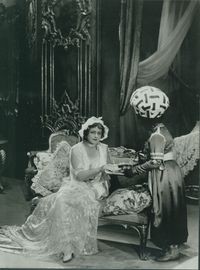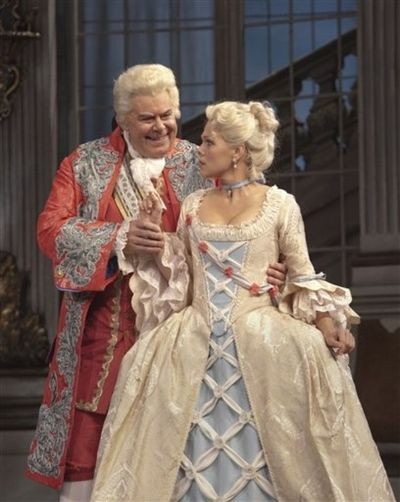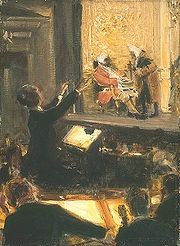Der Rosenkavalier: Soars at the Met
Susan Graham as Octavian in a Stunning Production
By: Susan Hall - Jan 08, 2010
Der Rosenkavalier
by Richard Strauss
Metropolitan Opera
January 6, 2010
Edo de Waart, conducting
Featuring:
On January 6th, the Metropolitan Opera performance of Der Rosenkavalier was also a dress rehearsal for the HD broadcast of the opera to theaters on January 9th. If the lead up is any indication of what we can expect in HD, we are in for a grand time.
Cameras dangled like dinosaur's feet in Jurassic Park, stepping forward and up and down from the balcony on their gangly extensions. A large camera sat in front of me to the right, and I could just imagine the small frame blown up on the big screen. A traveling camera scooted cross the stage in front of the conductor and miraculously avoided the prompt box, busily going back and forth so no detail of this magnificent production will be missed. Glamorous settings, breathtaking costumes, and performances of infinite variety capture the cunning and the tenderness of Hugo von Hofmannsthal's story.
I can't imagine a better cast. Surely the Marschallin of the 1960 film production, Elizabeth Schwarzkopf, was mistaken when she canned the Met's current Marschallin, Ms. Fleming, as a student.
The great Lotte Lehman sang Sophie, Octavian and the Marschallin in her day, but came to the Marschallin role last. "A good Marschallin has to be not only a good singer and a superb actress, but also a many-faceted, sparkling human being, a great lady, a bewitching lover and a conversationalist of the highest order." In Ms. Fleming we have all of the above.
The Baron brings a beautiful big bass from Iceland, but he is as warm, as foolish and impish as the Baron should be. A star turn. After she warmed up, Christine Shafer was lovely as Sophie.
Susan Graham, the true star of the show, soared as Octavian. Lehmann points out that Octavian is a subtle role, because he is of noble birth. Grace and good manners are part of him. "He is actually incapable of carrying out in practice the vulgarity he is attempting to caricature." Susan Graham would surely have thrilled Ms. Lehmann.
This Met production has all its i's dotted and t's crossed and is sure to be a visual treat in HD. The music, because Strauss is Strauss, is to die for. If you don't know the opera, you will surely be familiar with some of the waltzes from dancing school days or the ice skating rink.
Film productions of the opera began early on. As the film industry began to blossom, librettist Hugo von Hofmannsthal was immediately intrigued by the form. Pan-Films AG of Vienna approached Strauss and Hofmannsthal for the rights to produce a silent film. Hofmannsthal wrote Strauss, who was reluctant: "...opera on stage will not suffer in any way; on the contrary, I would look upon the film, when it comes out, as a positive fillip and new impetus to the opera's success in the theater." When Strauss learned of the money to be made, all his reservations faded away. He conducted the premier of the film, which provided only pictures and titles, at the Dresden Opera House.
In the film, Octavian was played by a man, and the character of the Feldmarschall, offstage in the opera, is brought forward. The third Act is opened to include battle scenes in which the Feldmarschall fights. The film's Baron crossed and uncrossed his legs to express delight – picked up by Sigmundsson in the production to be broadcast.
The second Rosenkavalier film, produced in 1960, was a straight transfer of the opera to cinema. The director set up cameras around the stage and let them run the whole time. He then edited miles of film. No phrase is ever interrupted by a camera angle, nor do the angles become dull or repetitive.
Whether or not Gary Halvorson, the superb director of many of the Met's HD broadcasts, has looked at this film, and other early transfers of opera from one form to another, a sensitivity to music, and the human voice is evident in all his previous productions.
The MP from North Ireland, a new Mrs. Robinson (The Graduate), has gotten into trouble recently by raising money from real estate developers to give to her 19 year old lover. She might well have taken a page from the Marschallin, and passed the young man on to the greater glory of spring love. The Marschallin respects the rights of youth over her own claims to love, or so Lehmann says.
Strauss and Hofmannsthal did not want the opera to end on a sentimental tone, so the little Moor who attends the Marschallin returns to find the handkerchief she has dropped. He looks around for it everywhere and finally finds it. Don't miss this superb production,





